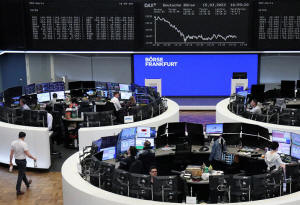European stocks gain as dollar eases, oil prices fall
 Send a link to a friend
Send a link to a friend
 [April 18, 2024] By
Elizabeth Howcroft [April 18, 2024] By
Elizabeth Howcroft
LONDON (Reuters) - Global markets showed signs of recovery in early
European trading on Thursday, with stocks rising and the U.S. dollar
pulling back from recent gains, while finance chiefs of the U.S., Japan
and Korea issued a rare warning about currency weakness.
Stock markets sold off earlier this week, while Treasury yields and the
U.S. dollar surged to multi-month highs, as investors were spooked by
tensions in the Middle East after Iran's missile and drone attack on
Israel on April 13. Mixed quarterly company earnings so far and recent
comments from the U.S. Federal Reserve, which dampened rate cut
expectations, also made investors more risk-averse.
The risk-off pullback showed signs of easing on Thursday. Asian stocks
made their biggest gains in a month and European stocks opened higher,
helped by more positive company earnings.
At 0855 GMT, the MSCI World Equity Index was up 0.2% on the day, but
still down 1.9% so far this week.
The pan-European STOXX 600 was up 0.2%, while London's FTSE 100 was up
0.3%.
Fiona Cincotta, senior markets analyst at City Index, said that markets
were being supported by a shift in focus away from the Fed and towards
upcoming earnings, including Netflix later on Thursday.
Comments from European Central Bank vice president Luis de Guindos and
an easing of oil prices have also helped support sentiment in Europe,
she added.
"Thereís still a little bit of optimism of lower rates, in the euro
zone, thatís helping support European stocks," Cincotta said.
Oil prices eased, with Brent futures down 0.5% at $86.87 a barrel and
U.S. West Texas Intermediate (WTI) crude futures down 0.5% at $82.27 a
barrel.
The two benchmarks slid 3% on Wednesday, in a move attributed to signs
that fuel demand is lower than expected this year, amid flagging
economic growth in China.

[to top of second column] |

The German share price index DAX graph is pictured as stocks slid
following the shares of Credit Suisse hit a record low in a rout of
European bank stocks, as investor concerns about sector stresses
triggered by Silicon Valley Bankís implosion deepened, at the stock
exchange in Frankfurt, Germany, March 15, 2023. REUTERS/Staff/ File
photo

Lower oil prices can be seen as positive for stock markets as they
help contain inflation, improving the chances for central bank
interest rate cuts.
Analysts do not expect dramatic new sanctions on Iranian oil, which
accounts for about 3% of global output.
The U.S. dollar index was down 0.1% at 105.84 and the euro was up by
less than 0.1% at $1.0677. The dollar had surged in recent weeks,
and is up 1.3% so far this week after the index hit as high as
106.51 on Tuesday.
The United States, Japan and South Korea agreed to "consult closely"
on foreign exchange markets in their first trilateral finance
dialogue on Wednesday, acknowledging concerns from Tokyo and Seoul
over their currencies' recent sharp declines.
Analysts said the rare warning from the three countries' finance
chiefs may lay the groundwork for Japan to intervene in the yen.
The dollar-yen pair was at 154.34, within sight of Tuesday's 154.79,
which was the yen's weakest in 34 years.
U.S. Treasury yields were edging down, with the 10-year yield at
4.5711% and the 2-year yield at 4.9241%.
Euro zone government bond yields also edged lower, with Germany's
10-year yield down 3 basis points at 2.441%.
Gold was a touch higher at 2,379.77.
(Reporting by Elizabeth Howcroft; Editing by Tomasz Janowski)
[© 2024 Thomson Reuters. All rights
reserved.]
This material may not be published,
broadcast, rewritten or redistributed.
Thompson Reuters is solely responsible for this content. |